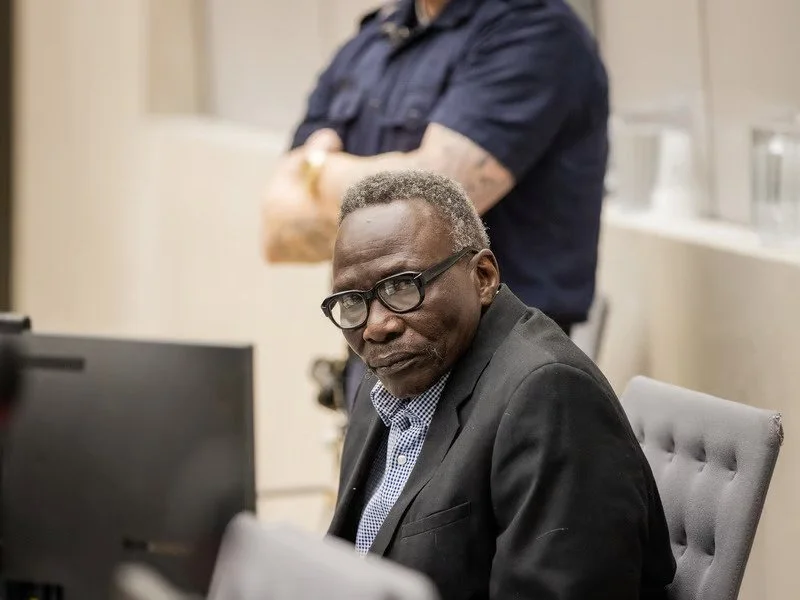The ICC Makes its First Conviction in the Sudan Case
Ali Muhammad Ali Abd-Al-Rahman (aka Ali Kushayb), October 19, 2023 during the opening of the defense statements at the International Criminal Court in The Hague, Netherlands (ICC-CPI via Courthouse News)
At 14:00 local time on October 6th, the International Criminal Court (ICC) delivered a verdict against Sudanese militia leader Ali Muhammad Ali Abd-Al-Rahman. Abd-Al-Rahman, commonly called Ali Kushayb, was a commander of the Janjaweed, a nomadic militia operating in the Sahel region.
This verdict is the first the ICC has issued regarding the violence in Sudan. Abd-Al-Rahman stood trial for a series of crimes that are representative of this violence. With this verdict, the ICC sets the tone for how the court will treat further trials of Sudanese fighters.
The ICC issued the warrant for Abd-Al-Rahman’s arrest in February 2007. After a brief arrest and release in 2008, Abd-Al-Rahman turned himself in for arrest in June of 2020 after Sudan’s government said it would cooperate with the ICC, causing him to fear that the authorities would kill him. Abd-Al-Rahman stood accused of thirty-one counts of war crimes and crimes against humanity for atrocities committed in Sudan between 2003 and 2004. The ICC verdict found Abd-Al-Rahman guilty on twenty-seven of the thirty-one counts. Abd-Al-Rahman was not found guilty only of crimes related to inhumane treatment during attacks on the villages of Mukjar and Deleig.
Abd-Al-Rahman’s crimes were committed over two decades before the trial, but the violence he participated in killed and displaced hundreds of thousands. Between 2003 and 2004, Abd-Al-Rahman orchestrated 504 murders, 20 rapes, and the forced displacement of 41,000 people. This violence not only harmed the victims back in 2003 and 2004, but continues to ripple through Sudan today.
As the verdict was announced, conflict continued to rage in Sudan. In 2023, tensions between Sudan’s military and the paramilitary Rapid Support Forces (RSF) erupted. These parties were meant to oversee a democratic transition after a 2019 conflict. The RSF was born out of the Janjaweed militia, and Janjaweed groups still provide aid and assistance to the RSF.
The Janjaweed have been accused of committing genocide against non-Arab Sudanese communities from 2003 to 2008. Since the resurgence of violence in Sudan in 2023, the RSF has faced similar accusations of genocide against non-Arab Sudanese people. The conflict in Sudan is currently one of the worst humanitarian crises in the world. Since 2023, the fighting has killed at least 40,000 people and displaced 12 million others. In addition to the physical violence, famine is raging through Sudan. According to the World Food Programme, over 24 million people are facing severe food insecurity.
Notably, Abd-Al-Rahman was found guilty of multiple crimes of rape as a war crime and as a weapon of war. The ICC has found defendants guilty of sex crimes before, but it has faced difficulty in prosecuting and convicting defendants for the crimes of sexual violence and rape. Sex crimes are notoriously difficult to investigate, and the ICC has had a number of sex crime charges dismissed for lack of evidence or non-applicability. In the first fifteen years of the ICC, the court only prosecuted eight sex-crime cases, and only two achieved convictions. The court even overturned its first-ever conviction of sex crimes only two years after the decision was given. With Abd-Al-Rahman’s conviction for rape as a war crime and crime against humanity, the ICC is taking another important step towards successfully prosecuting conflict-related sexual violence, both in Sudan and other cases around the world.
The conviction is a landmark for the ICC. Abd-Al-Rahman's conviction affirms the UN Security Council’s condemnation of the Darfur war as a genocide. With this conviction, the court has set a precedent for recognising the crimes committed in Sudan as war crimes and crimes against humanity. This legal precedent will set the tone for future ICC trials regarding the conflicts in Sudan. This case also reaffirms that it is possible for the ICC to overcome the hurdles unique to sexual violence and successfully prosecute sex crimes as crimes against humanity. By finding Abd-Al-Rahman guilty, the ICC has created a precedent in the international community for recognising the crisis in Sudan as a conflict with elements of genocide and ethnic cleansing, which can guide further international actions in regards to Sudan.
As the RSF continues to commit atrocities and the conflict in Sudan creates new victims twenty years after Abd-Al-Rahman’s crimes, the ICC verdict should spur other governments and international bodies to take action to further justice in Sudan.

